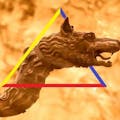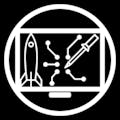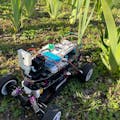

- Categories:
- NXP Awards
- Runner Ups
- Bosch Sensortec Sustainability Award
- Dronecode Foundation Open Source Award
NXP Awards
1st place was awarded a $5000 e-giftcard ($5,000 value), 2nd place was awarded a $3000 e-giftcard ($3,000 value), and 3rd place was awarded a $1500 e-giftcard ($1,500 value)
Runner Ups
Each runner up was awarded a $500 voucher for NXP webshop ($500 value)
Bosch Sensortec Sustainability Award
The winner was awarded a 500 € voucher for the Arduino Official Store ($500 value)
Dronecode Foundation Open Source Award
The winner was awarded a $500 e-giftcard ($500 value)
Overview
The NXP HoverGames is back with another challenge – and this time, it’s all about sustainable food production. We’ve had some amazing ideas in our first two years, solving issues in firefighting and pandemics with drones, so what can you come up with now?
Humanity’s growth and success over the last few thousand years is arguably due to our ability to feed ourselves. Whether it’s farming, hunting, fishing, or another source of food, we have been able to manage food ecosystems around the world.
But our world’s population is still growing fast, and hundreds of millions of people already go hungry, while habitats are destroyed for agriculture – can we claim success when children are still not getting enough to eat? While we need more food, we must also ensure that food and farming is not damaging our environment, with greenhouse gas reduction a priority.
Whether it’s shifting cultivation in the tropics, fish farming, commercial grain farming in Europe, or tea plantations in Asia and Latin America –we need to make all the different types of farming, food production and its supply chain as efficient as possible, without damaging habitats and the diversity of nature. We also need to meet new demands for organic, cruelty-free food, while taking into account the millions of people who rely on the food industry for their incomes. Technology will be essential in meeting all these challenges.
Because of this, we’re focusing on sustainable food ecosystems for the third NXP HoverGames. We need you and your ideas – show us how drones and rovers can make our food ecosystem more sustainable!
Of course, it’s not just about farming: we still get much of our food from fishing, which represents 17% of the current global production of edible meat, as well as from gathering or hunting wild plants and animals. Invertebrates are also on the menu: we get honey from bees, and eating insects is popular in many countries.
In today’s ecosystems, money has become the most important criterion. Corn may grow in my neighborhood but sold in China, while shrimp are fished in Europe’s North Sea, but peeled in North Africa. Farming has become more efficient, but with a focus on monoculture that can harm wildlife. The balance has shifted too far, and we have an unsustainable system – how can technology help us fix it?
WHAT WILL YOU ENABLE YOUR NXP HOVERGAMES DRONE TO DO?A famous pioneer, Neil Armstrong, once said: "Science is about what is, and engineering is about what can be." Show us what the food production of the future can be, and how autonomous drones and rovers can get us there.
Your challenge is to come up with innovative ways to use drones and rovers in sustainable food production. Feel free to interpret this quite broadly – you could go for anything that supports sustainable food production, in conventional agriculture, aquaculture or new areas such as vertical farming. Your application could be in a desert, over the oceans, or in the tropical rain forest. Or you could focus on our changing climate and how it might affect food production, or look at how we can better protect animals and insects, and maintain biodiversity.
Your NXP HoverGames vehicle should be able to carry out its mission as autonomously as possible, with the help of your code. Your drone or rover could, for example, fly or drive across fields of crops looking for damage or unusual growth that might indicate pests or disease, and only report back to its human operator when it sees something wrong.
NEW! Bosch Sensortec Sustainability AwardNXP is proud to announce that we have teamed up with Bosch Sensortec, adding their BME688 AI-enabled environmental gas sensor to the developer kits. These compact and low-power sensors can detect a broad range of gases in the part per billion (ppb) range. The gas scanner can be customized for sensitivity, selectivity, data rate and power consumption and can be trained to a specific application using the Bosch BME AI-Studio tool. For example, in a drone or rover application, the presence of volatile sulfur compounds (VSCs) can be used as an indicator for bacteria growth in food crops. Bosch Sensortec also supports the challenge by offering a special sustainability award to honor the most effective sensor-based solution that pursues sustainability goals.
In line with the Bosch business principle "Invented for life," Bosch Sensortec aims to improve people's quality of life and safeguard the livelihoods of present and future generations. Sustainability, climate protection, and nature conservation play a central role in this.
We see innovation as a driving factor in the fight against climate change and for a more sustainable future. That is why we are offering a special sustainability award at this year's NXP HoverGames.TECH YOU'LL USE
The NXP mobile robotics kits are modular and developer-friendly, using reliable automotive and industrial-grade components from NXP, and supported by PX4 - the largest commercially deployed open-source drone software stack with business-friendly licensing. You can experiment with additional hardware components from NXP and other providers – you are only bound by your own creativity.
Mobile robotics platforms:
Choose between the HoverGames drone kit and the all-new HoverGames rover kit.
The drone kit contains:
- Strong, rigid lightweight carbon fiber quadcopter frame with platform, mounting rails, landing gear, motor controllers, motors and props
- Telemetry radio and remote control (RC) radio
- Vehicle Management Unit (RDDRONE-FMUK66 FMU) that’s supported by the open-source PX4 flight stack on top of NuttX RTOS.
The rover kit contains:
- High-tech platform for mobile robotics built on top of a WLToys 12409 chassis
- All necessary components such as a motor, ESC, servo and GPS
- Vehicle Management Unit (RDDRONE-FMUK66 FMU) that’s supported by the open-source PX4 flight stack on top of NuttX RTOS.
Mission Computer:
Exclusively as first access for developers around the world, contestants applying successfully will get to use the all-new NXP NavQPlus board in their project
The board features abundant capability in vision, neural-net acceleration, and security:
- i.MX 8M Plus application processor with a Neural Processing Unit (NPU) operating at up to 2.3 TOPS.
- Dual MIPI-CSI cameras with dual ISPs. Hardware accelerated multimedia capabilities including 1080p60 h.264/h.265 video encode and decode
- 1000Base-TX Gb Ethernet with IX industrial connectors
- Dual CAN-FD
- Dual USB-C 3.1
- WiFi 5 / BTLE 5.0
- Linux Ubuntu/Yocto, ROS/ROS2, FastRTPS, OpenCV
- SE050 Edgelock secure element with NFC interface
Application Sensor:
All contestants applying successfully for hardware will get the all-new Bosch gas sensor + connecting cables
All contestants applying successfully for hardware will also receive smart sensing solutions from Bosch Sensortec, including the Adafruit BME688 with STEMMA QT standard connectors and the BMI088 onboard the FMU, a high-performance inertial sensor."
Bosch Sensortec BME688 is the first gas sensor with Artificial Intelligence (AI) and integrated high-linearity and high-accuracy pressure, humidity and temperature sensors. It is housed in a robust yet compact 3.0 x 3.0 x 0.9 mm³ package and especially developed for mobile & connected applications where size and low power consumption are critical requirements. The gas sensor can detect Volatile Organic Compounds (VOCs), volatile sulfur compounds (VSCs) and other gases such as carbon monoxide and hydrogen in the part per billion (ppb) range.
The Bosch Sensortec BMI088 is a high-performance 6-axis inertial sensor that allows for highly accurate measurement of orientation and detection of motion along three orthogonal axes. Consisting of a 16-bit digital, triaxial accelerometer and a 16-bit digital, triaxial gyroscope, the BMI088 is unique in the class of high-performance IMUs used in harsh environments such as those ones in drones and robotics applications. Apart from its high vibration robustness, the excellent temperature stability of BMI088 helps reducing design efforts and costs on a system level.
Dronecode Foundation invites winners to their annual Developer Summit:
- All winners will be invited to attend PX4 Developer Summit 2023, read more about the largest drone developer conference here
- 1st prize winner of Hovergames 3 will get free tickets + travel stipend/scholarship for up to 2 people
- 2nd and 3rd prize Hovergames 3 winners will get free tickets for the conference
View the 2022 conference experience in the video below:
Prizes
NXP Awards

1st Place
1 winner
2nd Place
1 winner
3rd Place
1 winnerRunner Ups

Bosch Sensortec Sustainability Award
The Bosch Sensortec Sustainability Award honors the most convincing sensor-based solution that pursues sustainability goals. The winner of the award will be rewarded with a 500 € voucher for the Arduino Official Store.

Dronecode Foundation Open Source Award
The Open Source Award recognizes the most creative uses of the HoverGames Kit implementing open technologies from the Dronecode ecosystem.

Judges
Matthias Wilkens is manager for industry partnerships and university programs at NXP Semiconductors. He is leading the HoverGames since its beginning in 2018. Working for the CTO department, Matthias is closely aligned with innovation and prototyping at NXP. Moreover, he is part of the ESG team driving the change towards a sustainable future.
Iain Galloway P.Eng. is the mobile robotics team lead and engineer within the CTO organization of NXP Semiconductors. He has over 25 years of experience in the industry as the technical strategic lead, coordinating across the NXP business units to provide the appropriate solutions to the mobile robotics ecosystem. Iain is a strong supporter of open source development, and has been leading the technical side of HoverGames since its inception.
Ralf Schellin received his Ph.D. degree in Electrical Engineering and his Master's degree in Technical Physics at the Technical University of Darmstadt,Germany. Currently, he is based in Reutlingen,Germany, where he is Head of the Product Area MEMS of Bosch Sensortec. Prior to this, he was the Director of Product Management at Bosch Sensortec. From 2010 to 2014 he was leading a cross-divisional project at Bosch on Tiny Wireless Sensors for the Internet of Things. From 2007 to 2009 he was leading an engineering group at Bosch Sensortec. Between 2001 and 2006 he held various positions in engineering and product management at Siemens in Munich, Germany, in the area of mobile devices based on IP technologies. Between 1996 and 2000 he was leading various projects in the automotive area of Bosch in Reutlingen working on safety-relevant MEMS-based sensors. Prior to Bosch, he was holding a post-doc position in biosensors at theUniversity of Twente, Enschede, The Netherlands.
Richard Fix was born in 1978 in Nuremberg. He studied mathematics & physics and finished his Ph.D. 2009 at the Robert Bosch GmbH and the Max-Planck Institute Erlangen. Within the Bosch group, Dr. Fix was leading innovation studies, research, and development projects for products with chemical sensors for automotive, building, medical and consumer applications. After his position as senior product manager for environmental sensors at Bosch Sensortec GmbH, he started a new role as product portfolio manager for the product area MEMS in 2020.
Ramon Roche is the General Manager of Dronecode Foundation. Ramon is a community leader in the open-source drone ecosystem with more than a decade of experience working with stakeholders, open-source developers, and hardware manufacturers from the drone industry.
Resources
For NXP components, use these GitBooks - your getting-started technical resources:
- NavQ+ Mission Computer (Tips & Tricks link here)
- UCANS32K1 family CAN node boards
- Battery Management System (RDDRONE-BMS772)
- Ethernet Adapter (RDDRONE-T1ADAPT)
NXP TechDay event schedule and content archives
Ask your technical questions on NXP community forum here or in our discord server under channel #HoverGames
For Bosch components, these are the software tools for the gas sensor:
- BME688 Development Kit Software + App
- GitHub for all source codes
- Getting-started video for the AI studio
About us
NXP Mobile Robotics Ecosystem provides a broad portfolio of solutions for mobile robotics applications such as drones and rovers, including application-specific reference hardware and software solutions for vehicle management units, i.MX applications processor-based mission computers, automotive Ethernet and CAN-FD networking, battery management, IoT remote sensing and TOF/Vision sensing. Many of these solutions are complemented by NFC and secure element(s) for security and provisioning.
HoverGames series of hands-on virtual embedded hardware and coding challenges is the flagship annual developer event hosted with Hackster, uniting developers around the world to address some of the biggest challenges facing society using the NXP HoverGames hardware platforms.
Contest Status
🎉 Prizes awarded! 🎉
Timeline
Registration opens
June 16, 2022 at 12:00 PM PDT
Competition begins
October 6, 2022 at 9:00 AM PDT
Applications for hardware close
November 21, 2022 at 5:00 PM PST
Hardware recipients announced
December 5, 2022 at 1:00 PM PST
Submissions close
March 31, 2023 at 12:00 PM PDT
Winners announced by
Apr 28, 2023





















